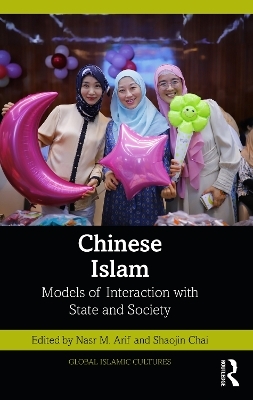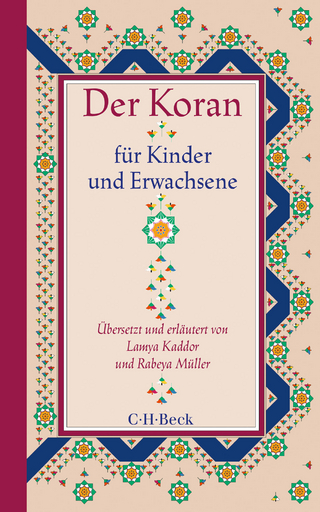
Chinese Islam
Routledge India (Verlag)
978-1-032-78968-2 (ISBN)
The work looks at the early interactions between Arab Muslim traders and the Tang dynasty in the seventh century, shedding light on the establishment of the first Muslim communities in China. The narrative then progresses through subsequent dynasties, examining the ebbs and flows of Muslim influence, integration, and indigenization. It looks at the emergence of the Hui and other Muslim ethnic groups, who play a central role in the story of Chinese Islam. By delving into their customs, beliefs, and distinctive practices, the authors unveil the intricate process of indigenization, where Islam becomes deeply rooted in Chinese culture and society. One of the unique features of this collection is the nuanced analysis of the impact of major political events, as well as gradual social changes, on the process of adoption and transmission of Islam in China. The authors also highlight the role of economic activities, Chinese Islamic scholars, and key architectural landmarks in this multifaceted history.
Part of the Global Islamic Cultures series that looks at integrated and indigenized Islam, this book will be of interest to students and researchers of religion, Islamic studies, religious history, political Islam, cultural studies, Islamic law, and Asian studies. It will also be useful to readers who are interested in world religions, theology, and cultures.
Nasr Muhammad Arif is Visiting Professor at University of St Andrews, UK, and Professor of Political Science at Cairo University in Egypt. He served as Professor of Islamic Studies and founding Executive Director of the Institute for Islamic World Studies at Zayed University, UAE. He has published many works on political and social development, Islamic thought and movement, and Muslim culture and adaptations in English and Arabic. His works have been published in Arabic and translated into English, Spanish, Hungarian, Kurdish, Persian, Indonesian, and Urdu. His research concentrates on Islamic traditions and political thought, the history of Islamic cultures, political development, and comparative political systems. He received a PhD degree in political science, in 1995, from Cairo University, Egypt, and the University of Maryland, College Park, Maryland, USA. Shaojin Chai is a faculty member of the Department of International Relations at the University of Sharjah, UAE. Previously, he taught international relations courses at Zayed University in the UAE and was a nonresidential research fellow on Islamic studies at Hebei University in China. He has also served as a senior research fellow and adviser in the UAE Ministry of Culture & Knowledge Development and an international think tank. He has published articles and book chapters on Chinese global ethics and governance, China–Middle East relations and soft power, and Islam in China. He is a co-editor of Zhenghe Forum: Connecting China and Muslim World (2016) and a co-author of “Chinese Muslim Diaspora Communities and the Role of International Islamic Education Networks: A Case Study of Dubai” in Chinese Religions Going Global (2021). He received his PhD inpolitical science from the University of Notre Dame, Notre Dame, Indiana USA, in 2014.
List of Figures ix
List of Contributors x
Introduction 1
Nasr M. Arif and Shaojin Chai
PART I
Theological Paradigms, Intellectual History, and Identity Choice 17
1 Constructing Chinese Islamic Thought and Classics: Dialogue and Paradigms 19
Zhou Chuanbin and Shaojin Chai
2 Bridging Belief and Belonging: A History of Chinese Muslim Intellectual and Theological Traditions 36
James D. Frankel
3 Past and Present: Intermarriage Between Hui and Han in the Sinicization of Islam 57
He Jia
PART II
Chinese Muslims’ Relations With State and Society 73
4 The Role of Chinese Muslims in Administrative and Military Affairs: Historical Assessment and Contemporary Implications 75
Zhang Zhihua
5 Halal Food in China: Defining and Bridging Communities 95
Michael C. Brose
6 From Domestic Middleman Minority to International Intermediary: The Hui’s Role as a Soft Power in the Belt and Road Initiative 117
Ma Qiang
7 Shared History and Cultural Complexity: Communal Relations Between Chinese Muslims and Their Neighbors in Yunnan 139
Ma Xuefeng
PART III
Architecture, Arts, and New Cultures 157
8 Mosques in China: Contentious Structures and Competing Identities 159
Yuting Wang
9 Sinicization of Islam in China: Food, Clothing, and Daily Life 186
Ma Jianfu
10 A Brief History of Islamic Education in China 205
Jacqueline Armijo
Index 219
| Erscheinungsdatum | 10.07.2024 |
|---|---|
| Reihe/Serie | Global Islamic Cultures |
| Zusatzinfo | 2 Tables, black and white; 7 Halftones, black and white; 7 Illustrations, black and white |
| Verlagsort | London |
| Sprache | englisch |
| Maße | 156 x 234 mm |
| Gewicht | 453 g |
| Themenwelt | Geisteswissenschaften ► Religion / Theologie ► Islam |
| Sozialwissenschaften ► Soziologie ► Spezielle Soziologien | |
| ISBN-10 | 1-032-78968-9 / 1032789689 |
| ISBN-13 | 978-1-032-78968-2 / 9781032789682 |
| Zustand | Neuware |
| Haben Sie eine Frage zum Produkt? |
aus dem Bereich


